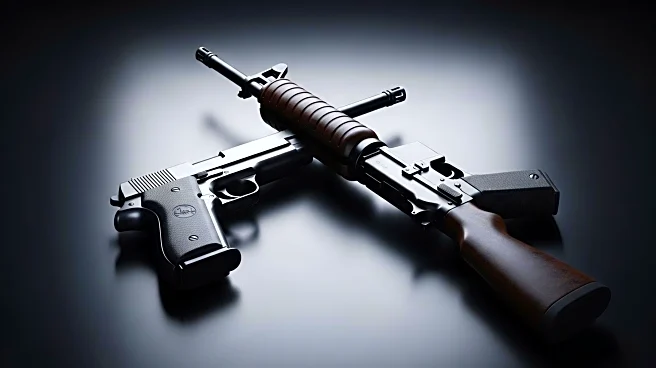What is the story about?
What's Happening?
A study conducted by the Sou da Paz Institute has revealed that lax gun laws in both the United States and Brazil are contributing to the arming of Brazilian criminal organizations. The study highlights an increase in restricted-use firearms, such as semiautomatic rifles, ending up in the hands of criminal groups in Brazil. These firearms are primarily manufactured in Brazil, but a significant number originate from the United States. The study analyzed firearm seizures from 2019 to 2023 in Brazil's southeast region, which is home to major criminal organizations like Sao Paulo's PCC and Rio de Janeiro's Red Command. The findings show an 11.4% increase in the seizures of restricted, military-style guns over the five-year period. The study attributes this rise to looser gun regulations under former Brazilian President Jair Bolsonaro, who allowed civilians access to weapons previously restricted to military and police use.
Why It's Important?
The findings of the study underscore the international implications of gun control policies, particularly how U.S. gun laws can impact crime in other countries. The study suggests that the U.S. is a significant source of firearms and components that feed into Brazil's illegal market, highlighting a well-documented smuggling route through South America. This situation poses a challenge for both countries in addressing organized crime, as the availability of firearms facilitates criminal activities. The study calls for the U.S. to recognize its role in this issue, as weak gun controls in the U.S. are seen as directly fueling organized crime in Brazil. This has broader implications for international relations and cooperation in combating transnational crime.
What's Next?
In response to the study's findings, Brazilian President Luiz Inácio Lula da Silva has already taken steps to tighten gun regulations, reversing the policies of his predecessor. The new decree restores restrictions on semiautomatic weapons and reduces the number of guns civilians can possess. It also requires documentation proving the need to hold such weapons. These measures aim to curb the flow of firearms into the hands of criminal organizations. Meanwhile, the study suggests that the U.S. should also consider tightening its gun control measures to prevent the illegal export of firearms and components to Brazil. This could involve increased regulation and monitoring of gun sales and exports.
Beyond the Headlines
The study raises ethical and legal questions about the responsibility of countries in controlling the flow of firearms across borders. It highlights the need for international cooperation in addressing the root causes of organized crime, which often transcend national boundaries. The findings could prompt discussions on the effectiveness of current gun control policies and the need for a coordinated approach to tackle the issue. Additionally, the study may influence public opinion and policy debates in both the U.S. and Brazil regarding gun control and its impact on crime.















